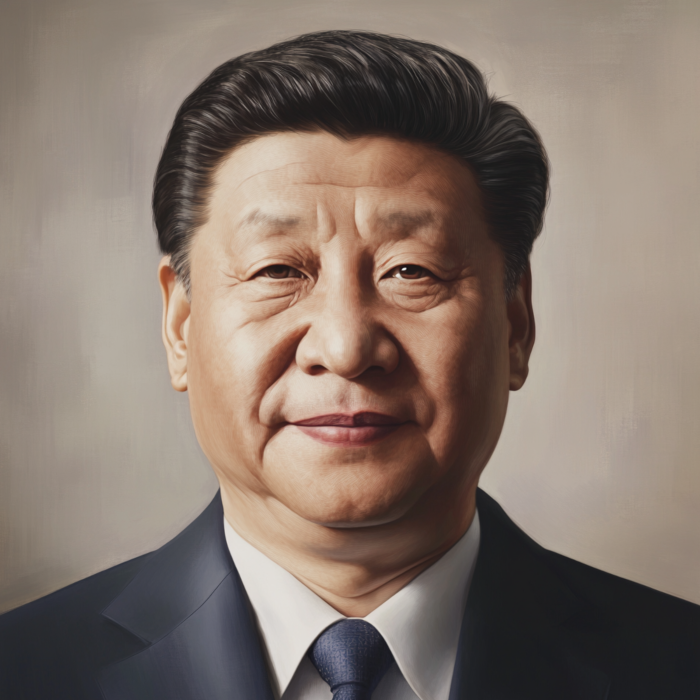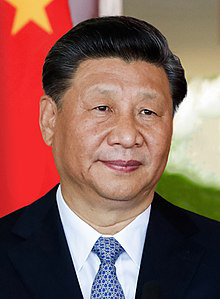
Xi Jinping (born June 15, 1953) is the current paramount leader of China, holding the highest offices of the country as General Secretary of the Chinese Communist Party (CCP), President of the People’s Republic of China, and Chairman of the Central Military Commission. He has emerged as one of the most powerful Chinese leaders since Mao Zedong, significantly influencing the country’s domestic policies, economic direction, and international role. Below is an overview of Xi Jinping's life, rise to power, and leadership:
Early Life and Background
- Family and "Princeling" Status: Xi Jinping was born in Beijing to Xi Zhongxun, one of the founding members of the CCP and a veteran revolutionary. Xi's father was a high-ranking official, which places Xi among the group known as the "princelings," children of prominent CCP leaders.
- Cultural Revolution Hardships: During the Cultural Revolution (1966-1976), Xi's father was purged, and his family faced political persecution. At age 15, Xi was sent to the countryside as part of Mao’s "Down to the Countryside" movement, spending several years in a rural village in Shaanxi province. This experience shaped his character and earned him some degree of respect as someone who shared the hardships of the common people.
- Party Career: Xi joined the CCP in 1974 and began working in local government positions. Over the years, he held a series of increasingly important roles in various provinces, developing a reputation as a pragmatic and capable administrator. He rose through the ranks in provinces like Fujian, Zhejiang, and Shanghai, gaining broad administrative experience.
Rise to Power
- Appointment to the Standing Committee: In 2007, Xi Jinping was appointed to the Politburo Standing Committee, the most powerful decision-making body in China. He quickly emerged as the likely successor to Hu Jintao.
- Becoming General Secretary: In 2012, Xi Jinping was named General Secretary of the CCP and Chairman of the Central Military Commission, effectively making him the leader of China. He officially became President of China in March 2013.
Leadership and Key Policies
Xi Jinping's leadership has been characterized by a consolidation of power, significant domestic policy shifts, and an assertive international agenda.
1. Power Consolidation and Authoritarian Control
- Centralization of Power: Unlike his immediate predecessors, Xi moved quickly to centralize power around himself. He has taken up the role of "core leader" of the CCP, established himself as head of multiple steering committees, and elevated his ideology to a prominent status within the party, termed as Xi Jinping Thought on Socialism with Chinese Characteristics for a New Era.
- Abolition of Term Limits: In 2018, China's National People's Congress voted to abolish presidential term limits, allowing Xi to remain in power indefinitely. This was seen as a departure from the norms established after Mao Zedong to prevent a cult of personality and lifelong rule.
- Anti-Corruption Campaign: Xi launched an extensive anti-corruption campaign shortly after coming to power. The campaign has been described as an effort to clean up the party and has resulted in the punishment of thousands of officials, including high-ranking ones. Critics argue that the campaign also served to eliminate political rivals and centralize power.
2. Economic Policies
- Economic Reforms and Challenges: Xi inherited a rapidly growing economy but has faced challenges related to slowing growth and structural imbalances. Under his leadership, China has aimed to shift from an export-driven model to one that emphasizes domestic consumption and innovation.
- State Control and Market Economy: Xi has expressed support for market reforms, but he has also emphasized the continued importance of state-owned enterprises (SOEs) and the dominance of the party in economic affairs. This approach has led to tighter regulation of private companies, especially in the technology and financial sectors.
- Common Prosperity: Xi has emphasized "common prosperity," a policy aimed at reducing income inequality by increasing regulations on the wealthiest individuals and corporations and emphasizing a more equitable distribution of wealth. This initiative has been a defining feature of his second term.
3. Domestic Policies and Social Control
- Social Credit System: Xi's administration has introduced a social credit system, aimed at rating citizens and businesses based on their behavior. The system is designed to promote trust and compliance but has also raised concerns about mass surveillance and privacy.
- Ethnic Minorities and Human Rights: Xi's government has faced international criticism for its treatment of ethnic minorities, particularly in Xinjiang, where mass detention camps are reported to hold over a million Uyghurs and other Muslim minorities. Policies in Xinjiang, as well as increased control over Tibet, are justified by the government as anti-terrorism measures.
- National Security and Crackdowns on Dissent: Under Xi, China has tightened control over Hong Kong, especially following the 2019 protests. The imposition of the National Security Law in 2020 effectively ended Hong Kong’s autonomy under the "one country, two systems" framework. The government has also cracked down on dissent throughout the mainland, targeting lawyers, activists, and NGOs that challenge CCP authority.
4. Foreign Policy and Global Ambitions
- Belt and Road Initiative (BRI): Xi Jinping's flagship foreign policy initiative, the Belt and Road Initiative, aims to develop trade routes and infrastructure linking China to countries across Asia, Africa, and Europe. The BRI is part of China's strategy to expand its influence globally and create stronger economic and political ties with participating countries.
- Assertiveness on Territorial Issues: Xi’s China has taken an assertive stance on territorial disputes, including claims in the South China Sea, where China has built artificial islands and increased its military presence. Tensions with neighboring countries like India and Japan have also increased during his tenure.
- "Wolf Warrior Diplomacy": Xi has fostered a more assertive style of diplomacy known as "wolf warrior diplomacy," characterized by Chinese diplomats adopting a more confrontational approach. This shift reflects Xi’s desire to present China as a global power that will not be pushed around by Western countries
Key Achievements and Challenges
- Economic Growth and Technological Advancement: Under Xi Jinping, China has made significant strides in technology, including advancements in 5G networks, AI, and space exploration. The country's economic growth has continued, although at a slower pace compared to earlier decades.
- Control over the Party and Military: Xi has taken firm control of the party, the government, and the military, positioning himself as a strong, centralized leader. He has also emphasized the importance of a strong military, launching reforms to modernize the People’s Liberation Army (PLA) and pushing for the goal of building a "world-class" military by 2049.
- Domestic and International Criticism: Xi’s leadership style has drawn criticism for being increasingly authoritarian, with limited tolerance for dissent. Internationally, concerns have been raised about China’s human rights record, its handling of the COVID-19 pandemic, and its growing influence in developing countries through initiatives like the BRI.
Legacy and Future
- Third Term and Future Influence: In October 2022, Xi Jinping secured a third term as the General Secretary of the CCP, further cementing his place as China’s most powerful leader in decades. This extension of power has led many to believe that he could potentially serve for life.
- A Vision for China: Xi's vision for China includes national rejuvenation, which he often refers to as the "Chinese Dream." This involves economic modernization, technological leadership, a strong military, and an assertive global presence. He has set ambitious goals for China to achieve socialist modernization by 2035 and to become a fully developed, powerful nation by 2049—the centenary of the founding of the People’s Republic.
Xi Jinping is a transformative figure in modern Chinese history. His leadership has reshaped China’s political landscape, making it more authoritarian and nationalist. Domestically, he has pursued ambitious social, economic, and political reforms, while internationally, he has worked to enhance China’s status as a global superpower. His influence will undoubtedly shape China and its role in the world for years to come, though debates continue over the long-term impact of his policies on economic growth, political freedom, and international relations.



